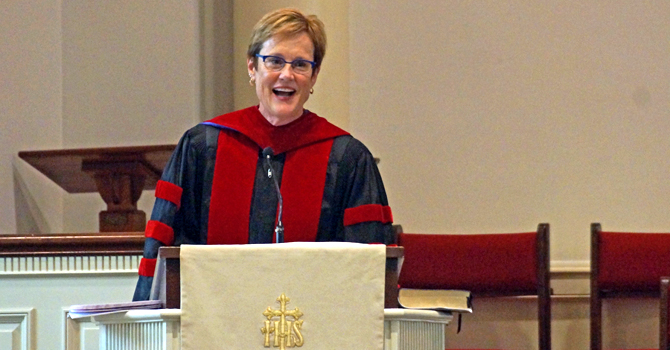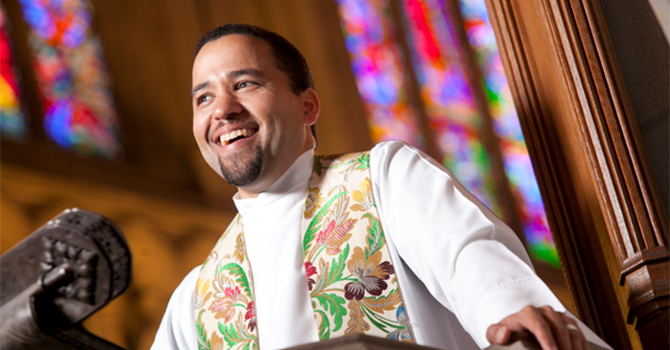Editor’s note: Faith & Leadership offers sermons that shed light on issues of Christian leadership. Van Dyk preached this sermon at her inauguration as the 10th president of Columbia Theological Seminary on Oct. 28, 2015.
“Welcome one another, therefore, just as Christ has welcomed you, for the glory of God.” “Welcome” is one of those wonderful, warm words that convey comfort and coziness. There is really nothing ambiguous or paradoxical about “welcome.” Oh, there is some gentle ribbing now and then. Robert Frost’s famous quip “Home is the place where, when you have to go there, they have to take you in” pokes a bit of fun at welcome. But it is a word with a fine reputation. “Welcome one another, therefore” -- that feels good.
And it should feel good.
But the welcome in Romans 15:7 has a whole lot more spine and muscle to it than our garden-variety, somewhat sentimentalized connotations of welcome. The welcome of Romans 15:7 is sturdy and bold. And it is in Romans 16 where we see what this sort of sturdy welcome looks like. In Romans 16, we see the contours of welcome and what it requires and what it produces. In other words, Romans 16 reveals the work of welcome.
On this inaugural day, in this celebrative moment in the history of Columbia Theological Seminary, and in my own life -- in the presence of these assembled delegates, my faculty and staff colleagues, gifted students, board of trustees members, my family, my mentors and friends -- we are commanded to welcome one another as Christ welcomed us. And to do that welcome well takes work.
Please don’t misunderstand me. I am not saying -- contrary to the deepest impulses of the Reformed tradition that has shaped me -- I am not saying that we must work to earn Christ’s welcome. Grace, after all, is a free gift. We cannot earn it. What I am saying is that to obey the command of Scripture “Welcome one another, therefore, just as Christ has welcomed you, for the glory of God” -- to do this welcome well takes work. “Welcome” is not an easy verb, in spite of its cozy connotations.
We have some examples of what this work looks like in Romans 16. So often passed over as expendable Scripture, Romans 16 is not so much a list of greetings as it is a concrete, particular, embedded and diverse constellation of stories. And this constellation of stories evokes and conveys the work of welcome.
Phoebe was a deacon in the church of Cenchreae, a suburb of Corinth in Greece. She was a church leader in that community, and her leadership had a way of lifting up other people’s ministries. We don’t know much about how she helped, but her empowering leadership was a work of welcome for the sake of the gospel.
Prisca and Aquila are most likely the same Priscilla and Aquila of Acts chapter 18 -- the believers Paul met in Corinth after they had been driven out of Rome by the order of the emperor. You’ll remember that Paul took a particular liking to them because all three were tentmakers -- they liked to get together and talk shop. Prisca and Aquila had apparently returned to Rome after the danger receded. Perhaps not receded enough, though -- we learn here that these two friends risked their necks for Paul -- again, we don’t know how -- but the story lies just beneath the surface. It is a story that shines faintly in the constellation of stories in this chapter and puts flesh and bones and breath on the command “Welcome one another, therefore, just as Christ has welcomed you.”
Epaenetus was the first convert in Asia -- quite a distinction. But what is the story here? What cost or consequence did this have in the life of Epaenetus? The ripple effects of this small line -- “Greet my beloved Epaenetus, who was the first convert in Asia for Christ” -- extend out and land on shores we do not know.
A very short story appears next -- “Greet Mary, who has worked very hard among you” -- but imagine the layers and layers of detail that are contained in that line. Mary worked hard. Perhaps she was a political advocate for the survival of that community in an often hostile environment. Perhaps she was a teacher, a preacher, a singer, a logistical mastermind. In any case, “Greet Mary, who has worked very hard among you.” This short story hints at the flesh and bones and breath of the command “Welcome one another, therefore, just as Christ has welcomed you.”
“Greet Andronicus and Junia” -- Christians before Paul himself, mentors to the leaders in the Christian community. Presumably, a married couple. Their story includes imprisonment along with Paul. Torn from their children, perhaps. Sometimes, the work of welcome includes sobering consequences -- imprisonment, injustice, persecution.
“Greet Ampliatus …; greet Urbanus … and … Stachys” -- “beloved in the Lord.” Imagine the particular stories that led Paul to that description, “beloved.”
“Greet Apelles, who is approved in Christ.” Paul could tell the stories of how Apelles distinguished himself in the work of welcome.
“Greet those who belong to the family of Aristobulus … [and] the family of Narcissus” -- no names of the family members here, just the names of the patriarchs. But the people touched by these leaders are right here at the edges of Paul’s greeting, people with their own stories.
“Greet my relative Herodion.” Paul uses a term of affection, “my relative”; he is fond of Herodion. The stories rise to the surface and tug at our imagination.
“Greet those workers in the Lord, Tryphaena and Tryphosa” -- sisters, perhaps? Maybe even twins, just hinted with those rhyming names! Think of the stories that are suggested with that single word “workers,” the stories of the work of welcome.
The names start piling up; the stories start piling up: “Greet the beloved Persis, who has worked hard in the Lord. Greet Rufus, … and greet his mother,” who extended that mothering to Paul as well. The stories of comfort and care and instruction are hidden from us, but they are there.
The names pile up: Greet Asyncritus, Phlegon, Hermes, Patrobas, Hermas, Philologus, Julia, Nereus and his sister (I forgot her name!), Olympas, and everyone else!
This is not merely a list of names, not expendable Scripture; this is a constellation of stories, a sort of starry sky that faintly shines with the efforts, the struggles, the commitments of the work of welcome.
Let us suppose that Columbia Theological Seminary could be on the list of Romans 16. “And greet the community of faith at Columbia Theological Seminary, which has worked very hard for the sake of the gospel.” That’s all it would say -- all the stories and efforts and failures and successes would be pulsing just below the surface. I am quite sure this community could be in the constellation of stories that give flesh and bones and breath to the work of welcome.
And more -- let us suppose that the institutions in your worship bulletin, from 1784 to 1963, also could be on the list of Romans 16.
But I believe that the imperative “Welcome one another, therefore, just as Christ has welcomed you” must spur us on to deeper faithfulness to the work of welcome. I believe that we at Columbia -- and all of us, in our own contexts -- are called to new stories.
But this is not easy. Welcome that imitates Christ’s welcome of us is costly and difficult. Welcome is work because, as fallen and broken people, we seem to prefer to curl in on ourselves in fear rather than open ourselves in love. Welcome is work because, this side of heaven, it is -- predictably -- precisely what we do not do. Instead, we reject, we judge, we label, we build walls, we dismiss, we turn our backs, we shut our eyes, we stop our ears, we do not welcome. It’s easier that way, easier not to welcome. Welcome takes work.
You know, come to think of it, welcome takes work for God, too. God’s welcome of us in Jesus Christ has flesh and blood; the incarnation is hard divine work. God’s welcome of us in Jesus Christ has pain and death; the crucifixion is hard divine work. God’s welcome of us in Jesus Christ rolled away stones, emptied a grave; the resurrection is hard divine work. God’s welcome of us in Jesus Christ gathers a people called “church” and calls those people to join in the hard divine work of welcome.
You see, we love because God first loved us. We welcome because God first welcomed us. Our work of welcome patterns itself after God’s work of welcome in Jesus Christ.
So I wonder: What are the stories of welcome that we are called to create in this new chapter of the history of Columbia Theological Seminary? How can we, here and now, obey the command “Welcome one another, therefore, just as Christ has welcomed you”? I trust that this community is creating multiple stories of welcome on this campus and beyond. I will name just two.
Surely, some of the stories that we are creating here at Columbia are stories of the work of welcome for justice. The urgent realities in our culture of mass incarceration, gun violence, deeply embedded racism, disparities in educational opportunities and more -- more than we can name -- these realities stir us, rouse us and send us to do the work of welcome to those who experience nothing but rejection. These things are complex, of course. But theologian Willie Jennings reflects on how we must train ourselves to think about these matters. He said recently, “I suggest to you a new test for the character and quality of Christian intellectual work today: What effect does our work have on the bodies of poor women of color in this world? How is their situation helped or hurt by our work? Are we forming students and are we thinking together in ways that will make a difference for them?”
That is a blueprint for the work of welcome for justice.
Consider a true story: My congressman in the 5th Congressional District here in Atlanta, John Lewis, 75 years old, tells his stories of the long and difficult civil rights movement, stories of the hard work of welcome for justice. The 1961 Freedom Ride aroused violent reaction throughout the South, but the Freedom Riders -- black and white young adults with the fire of justice in their bones -- persisted with unaccustomed bravery. In Montgomery, the Freedom Ride bus -- with young John Lewis on board -- arrived at the station to a hostile crowd of angry white citizens. An official by the name of Floyd Mann, who was the public safety director of the Alabama State Troopers, pointed his service revolver to the sky and shouted, “There will be no killing here today. There’ll be no killing here today.” Floyd Mann risked his neck for the civil rights workers. Do you suppose what Floyd Mann did that day echoes what Prisca and Aquila did for Paul? Did Prisca and Aquila and Floyd Mann all risk their necks for justice? John Lewis then finishes the story: More than 25 years later, at the dedication of the Civil Rights Memorial in Montgomery, Mann approached him and said, “Congressman Lewis, do you remember me?” Lewis replied, “Mr. Mann, how could I forget you? You saved my life.”
Both Mr. Mann and Mr. Lewis -- in very different ways -- built a story of welcome for justice. Paul, maybe, would have said, “Greet John and Floyd, who have worked very hard among you.”
Surely, some of the stories that we are creating here at Columbia are stories of the work of welcome in a world of multiple faith traditions often violently split over religion. A report on world religious conflicts released in January 2014 by the Pew Research Center documents the extent of religious tension in the world. According to this data, Jews suffer hostility in 71 countries; Christians, in 110 countries; Muslims, in 109 countries. And although religious conflict is multidirectional, the simple fact is that it is Christians who often oppress Muslims, Jews and other Christians. This sobering report, we might note, was released before the more recent stupefying human suffering of Christians and Muslims in Syria.
This is the world, this world where God has placed us, and in which God says to us, “Welcome one another, therefore, just as Christ has welcomed you.” Our work of welcome must witness to the reign of Jesus Christ by hearing the cries of those who are refugees because of religion, economics and politics, who are persecuted, who are harassed and who are not like us. Witnessing to the reign of Jesus Christ in this context requires us to protect, defend, feed, clothe, wash and heal. Luke Timothy Johnson once said, “The challenge of how we might speak God’s Word today is real, serious, and not for the weak of heart.” This is the hard but holy work of welcome.
But we cannot rely on our own chest-out, chin-up kind of effort in the hard, holy work of welcome. We hunger and thirst for God to guide and strengthen us. Every day on this campus, we hunger and thirst for God -- in classrooms, in chapel, in ministry settings. We long to see what poet Rod Jellema has called “the slender incursions of splintered light,” those fragmentary glimpses of God’s presence and action.
I asked our students here at Columbia Theological Seminary a few weeks ago for stories of how their hunger and thirst for God is met in “slender incursions of splintered light,” and our students responded to me through emails and visits to my office. They told stories of God breaking into situations of confusion, injustice and grief. They gave me permission to share those stories, and I must limit myself to just one among many.
Gerlyn Henry wrote to me with this story: “I grew up in Canada but moved to India as a teenager for a few years. I lived in a society fragmented between the rich and the poor, living side by side. A huge house would be attached by a wall to eight or nine small huts. It was interesting but heartbreaking to watch the dynamics between the children who play on the street. I was watching one evening as all the rich kids gathered to play soccer because one of them bought a new soccer ball. I kept watching as one little boy from the hut tried as best he could to just touch the new ball. He had eyes of wonder!
“On noticing this, the other kids pushed him to the ground and ran down the street away from him. He started to cry. What happened next was amazing. One of the boys returned with another ball, not so new, and invited this little boy to play. Sure enough, the other kids came back. This story and others like it direct my ministry. We are called to break boundaries, cross boundaries and transcend boundaries. God was revealed through that boy who came back.”
It is Gerlyn’s hunger and thirst for God that gave her the eyes to see this story and the heart to tell it -- God’s presence in the most simple things, little kids playing soccer in India. Our students tell remarkable stories of their own work of welcome that is nourished by their hunger and thirst for God.
The work of welcome to which we are called here and now -- for justice, for witness in a multifaith world -- these and others are not miscellaneous goods. These are not random items on our institutional to-do list; these unfold because we have heard the word of the Lord: “Welcome one another, therefore, just as Christ has welcomed you, for the glory of God.” Did you catch that last phrase? All of this has a purpose; all of this that we do is aimed at the glory of God.
In the end, you know, it is really quite simple. Christ has welcomed us; we are to welcome others. This is the holy equation of God’s glory and God’s sure plan to heal this broken world. Friends, this is the good news. Thanks be to God. Amen.









